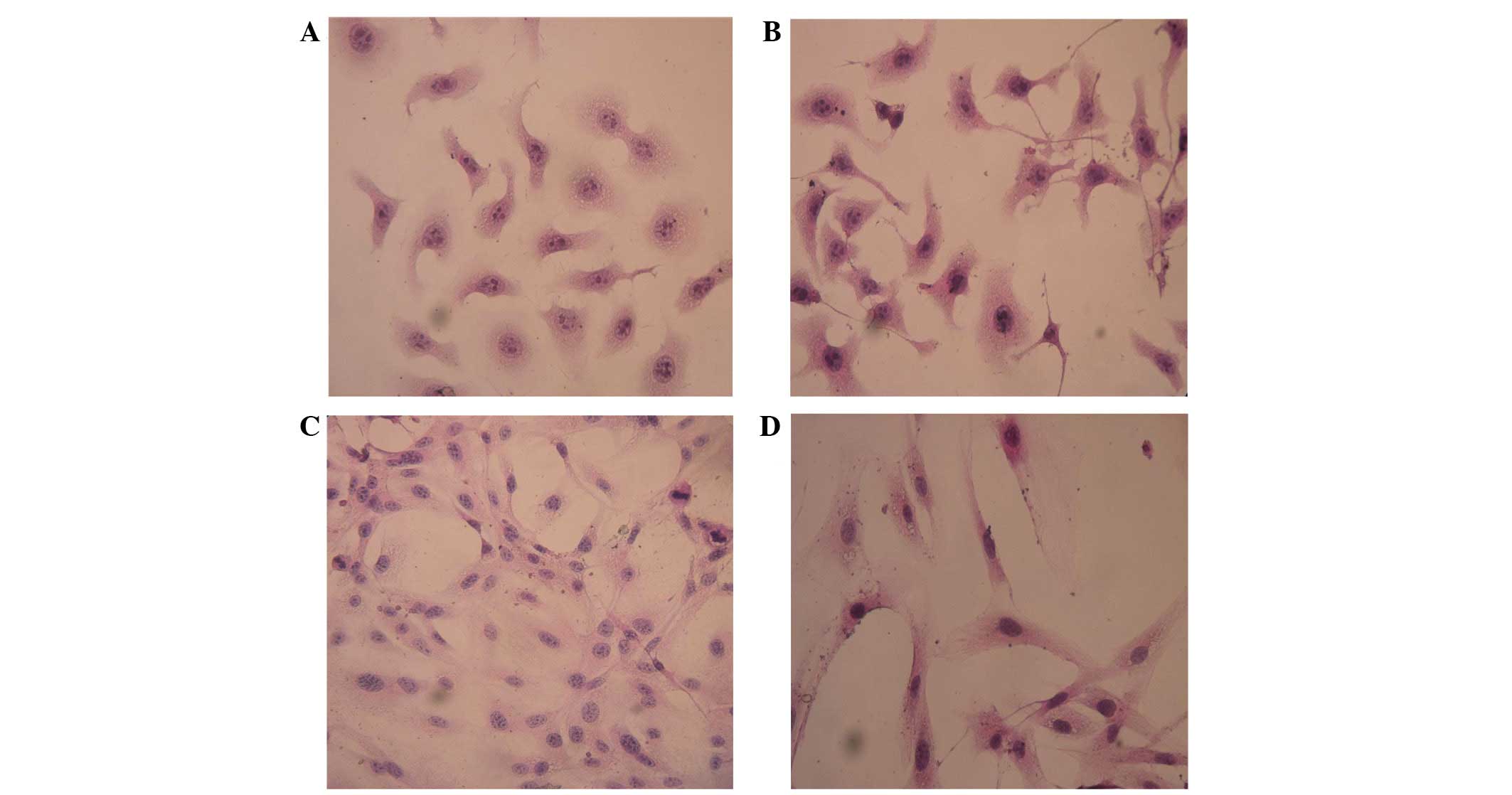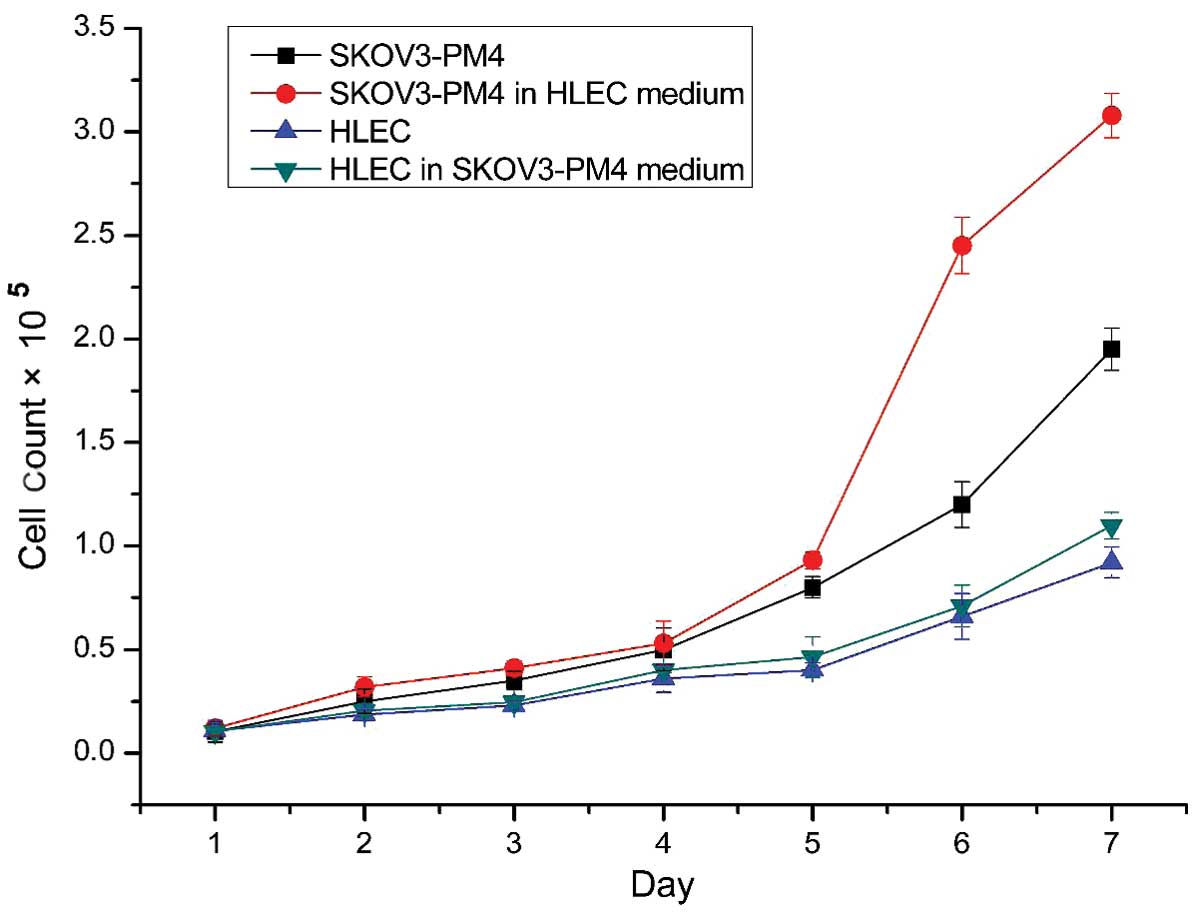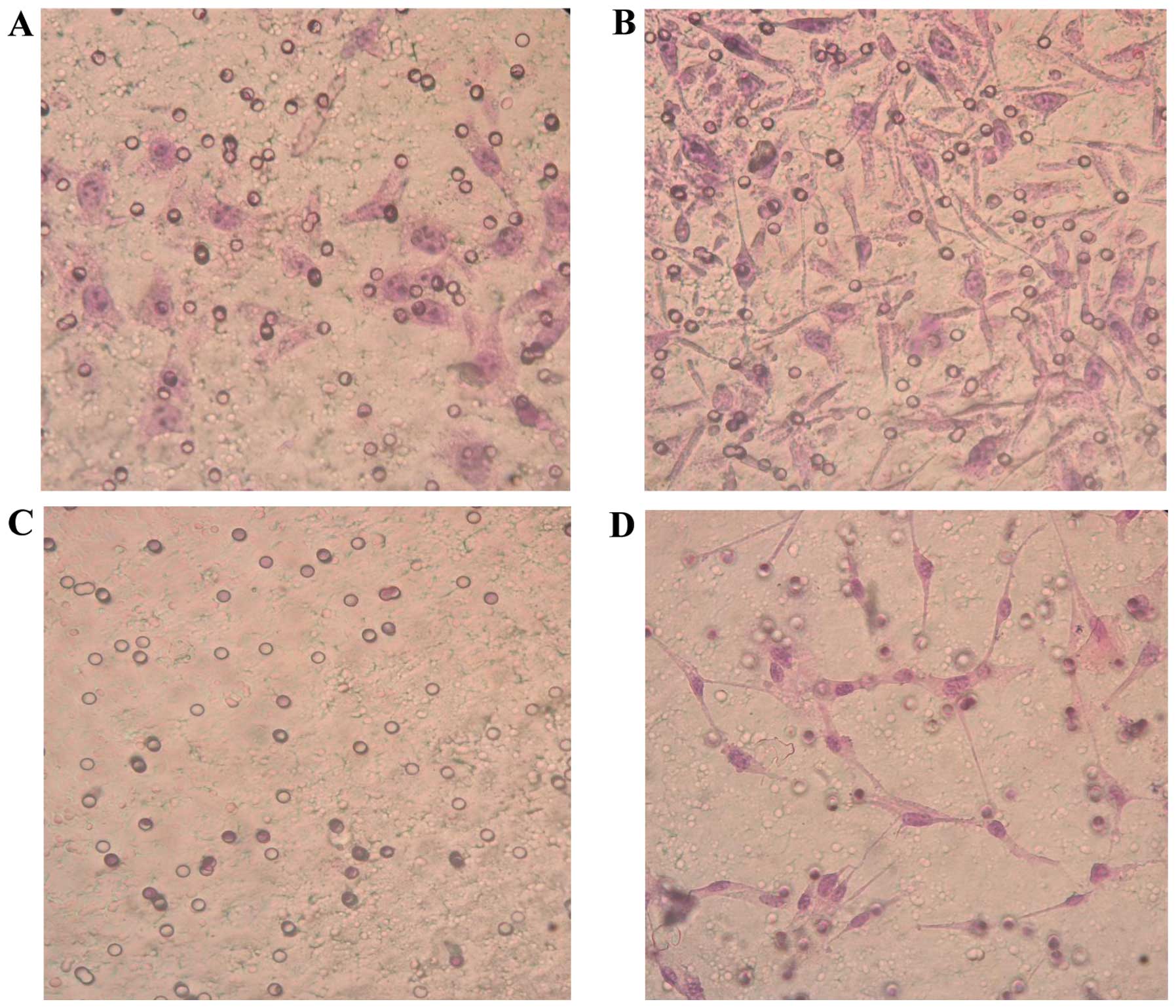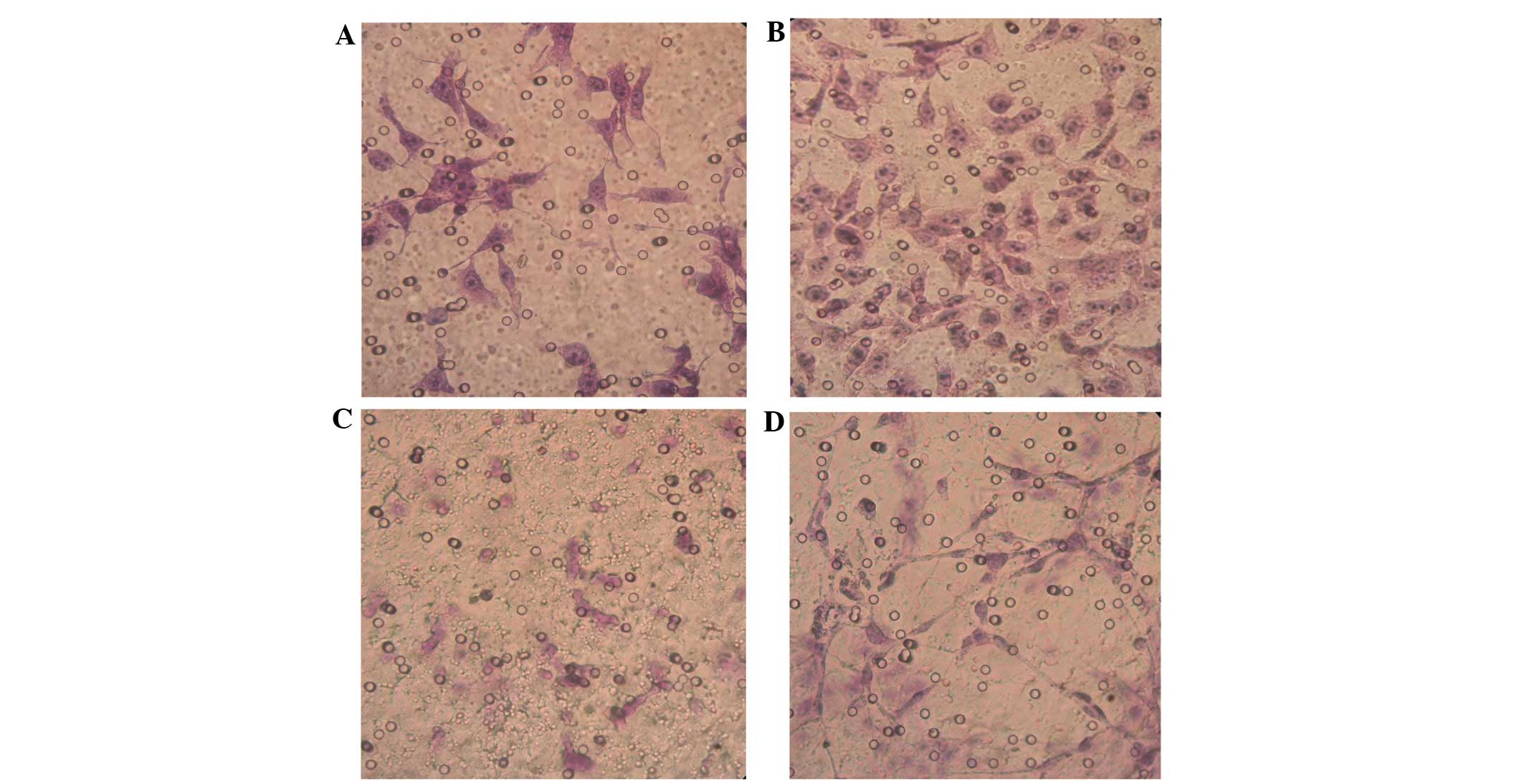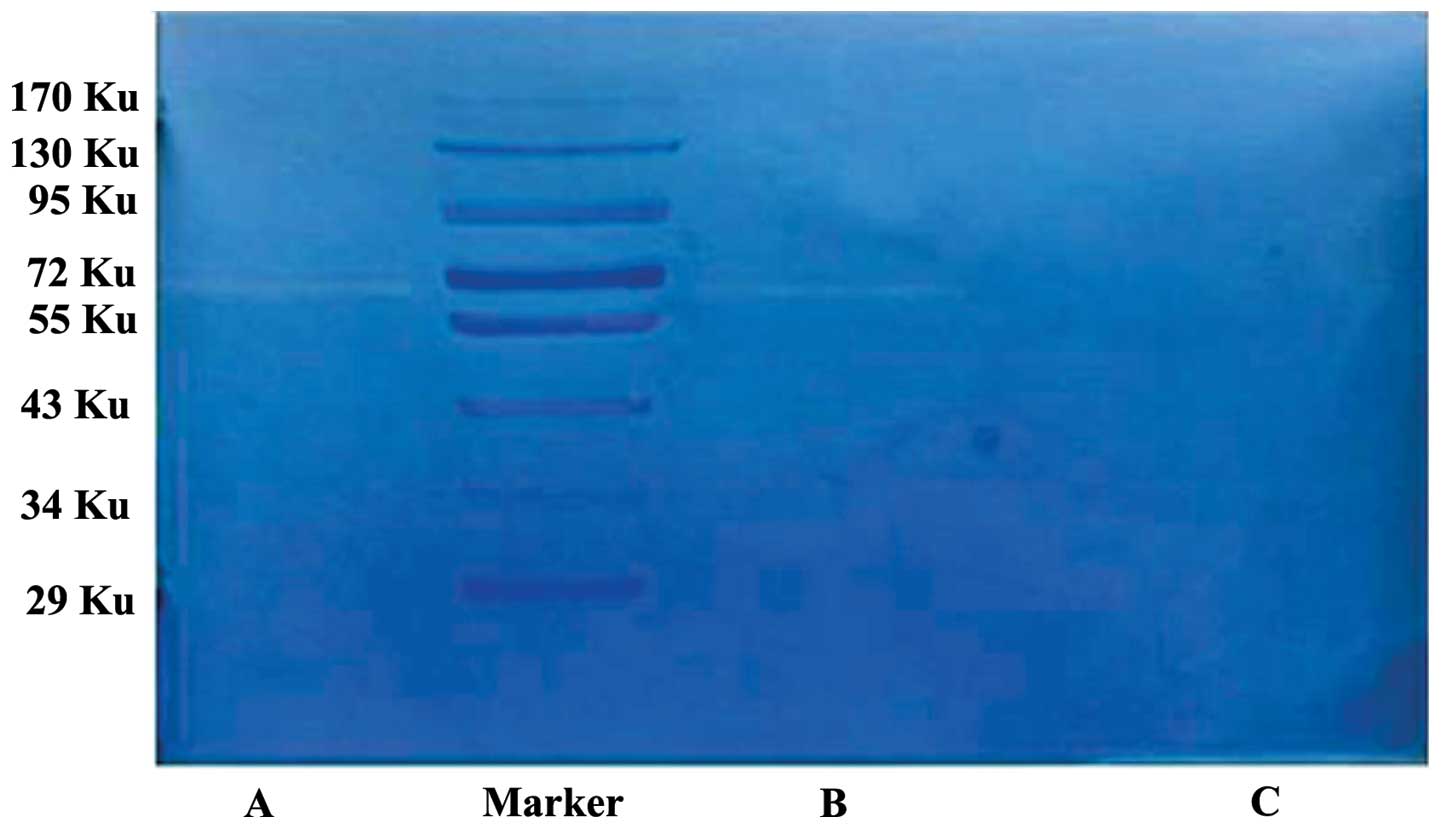|
1
|
Quail DF and Joyce JA: Microenvironmental
regulation of tumor progression and metastasis. Nat Med.
19:1423–1437. 2013. View
Article : Google Scholar : PubMed/NCBI
|
|
2
|
Wood SL, Pernemalm M, Crosbie PA and
Whetton AD: The role of the tumour-microenvironment in lung
cancer-metastasis and its relationship to potential therapeutic
targets. Cancer Treat Rev. 40:558–566. 2014. View Article : Google Scholar : PubMed/NCBI
|
|
3
|
Paget S: The distribution of secondary
growths in cancer of the breast. Lancet. 133:571–573. 1889.
View Article : Google Scholar
|
|
4
|
Fidler IJ: The pathogenesis of cancer
metastasis: The ‘seed and soil’ hypothesis revisited. Nat Rev
Cancer. 3:453–458. 2003. View
Article : Google Scholar : PubMed/NCBI
|
|
5
|
Whiteside TL: The tumour microenvironment
and its role in promoting tumour growth. Oncogene. 27:5904–5912.
2008. View Article : Google Scholar : PubMed/NCBI
|
|
6
|
Lorusso G and Rüegg C: The tumour
microenvironment and its contribution to tumour evolution toward
metastasis. Histochem Cell Biol. 130:1091–1103. 2008. View Article : Google Scholar : PubMed/NCBI
|
|
7
|
Joyce JA: Therapeutic targeting of the
tumour microenvironment. Cancer Cell. 7:513–520. 2005. View Article : Google Scholar : PubMed/NCBI
|
|
8
|
Berns A and Pandolfi PP: Tumour
microenvironment revisited. EMBO Rep. 15:458–459. 2014. View Article : Google Scholar : PubMed/NCBI
|
|
9
|
Korkaya H, Liu S and Wicha MS: Breast
cancer stem cells, cytokine networks, and the tumour
microenvironment. J Clin Invest. 121:3804–3809. 2011. View Article : Google Scholar : PubMed/NCBI
|
|
10
|
Brauer HA, Makowski L, Hoadley KA,
Casbas-Hernandez P, Lang LJ, Romàn-Pèrez E, D'arcy M, Freemerman
AJ, Perou CM and Troester MA: Impact of tumor microenvironment and
epithelial phenotypes on metabolism in breast cancer. Clin Cancer
Res. 19:571–585. 2013. View Article : Google Scholar : PubMed/NCBI
|
|
11
|
Lunt SJ, Chaudary N and Hill RP: The
tumour microenvironment and metastatic disease. Clin Exp Metastas.
26:19–34. 2009. View Article : Google Scholar
|
|
12
|
Salo T, Vered M, Bello IO, Nyberg P, Bitu
CC, Hurvitz Zlotogorski A and Dayan D: Insights into the role of
components of the tumour microenvironment in oral carcinoma call
for new therapeutic approaches. Exp cell Res. 325:58–64. 2014.
View Article : Google Scholar : PubMed/NCBI
|
|
13
|
Alitalo K and Carmeliet P: Molecular
mechanisms of lymphangiogenesis in health and disease. Cancer Cell.
1:219–227. 2002. View Article : Google Scholar : PubMed/NCBI
|
|
14
|
Alitalo K, Tammela T and Petrova TV:
Lymphangiogenesis in development and human disease. Nature.
438:946–953. 2005. View Article : Google Scholar : PubMed/NCBI
|
|
15
|
Schoppmann SF, Jesch B, Zacherl J, Riegler
MF, Friedrich J and Birner P: Lymphangiogenesis and lymphovascular
invasion diminishes prognosis in esophageal cancer. Surgery.
153:526–534. 2013. View Article : Google Scholar : PubMed/NCBI
|
|
16
|
Dutta S, Going J, Crumley A, Mohammed Z,
Orange C, Edwards J, Fullarton G, Horgan P and McMillan D: The
relationship between tumour necrosis, tumour proliferation, local
and systemic inflammation, microvessel density and survival in
patients undergoing potentially curative resection of oesophageal
adenocarcinoma. Br J Cancer. 106:702–710. 2012. View Article : Google Scholar : PubMed/NCBI
|
|
17
|
Tzur A, Kafri R, LeBleu VS, Lahav G and
Kirschner MW: Cell growth and size homeostasis in proliferating
animal cells. Science. 325:167–171. 2009. View Article : Google Scholar : PubMed/NCBI
|
|
18
|
Steeg PS: Tumour metastasis: mechanistic
insights and clinical challenges. Nat Med. 12:895–904. 2006.
View Article : Google Scholar : PubMed/NCBI
|
|
19
|
Valastyan S and Weinberg RA: Tumour
metastasis: Molecular insights and evolving paradigms. Cell.
147:275–292. 2011. View Article : Google Scholar : PubMed/NCBI
|
|
20
|
Pepper MS: Lymphangiogenesis and tumour
metastasis: Myth or reality? Clin Cancer Res. 7:462–468.
2001.PubMed/NCBI
|
|
21
|
Tobler NE and Detmar M: Tumour and lymph
node lymphangiogenesis-impact on cancer metastasis. J Leukocyte
Biol. 80:691–696. 2006. View Article : Google Scholar : PubMed/NCBI
|
|
22
|
Lengyel E: Ovarian cancer development and
metastasis. Am J Pathol. 177:1053–1064. 2010. View Article : Google Scholar : PubMed/NCBI
|
|
23
|
Karaman S and Detmar M: Mechanisms of
lymphatic metastasis. J Clin Invest. 124:922–928. 2014. View Article : Google Scholar : PubMed/NCBI
|
|
24
|
Pepper MS, Tille JC, Nisato R and Skobe M:
Lymphangiogenesis and tumour metastasis. Cell Tissue Res.
314:167–177. 2003. View Article : Google Scholar : PubMed/NCBI
|
|
25
|
He Y, Kozaki K, Karpanen T, Koshikawa K,
Yla-Herttuala S, Takahashi T and Alitalo K: Suppression of tumour
lymphangiogenesis and lymph node metastasis by blocking vascular
endothelial growth factor receptor 3 signaling. J Natl Cancer Inst.
94:819–825. 2002. View Article : Google Scholar : PubMed/NCBI
|
|
26
|
He Y, Rajantie I, Pajusola K, Jeltsch M,
Holopainen T, Yla-Herttuala S, Harding T, Jooss K, Takahashi T and
Alitalo K: Vascular endothelial cell growth factor receptor
3-mediated activation of lymphatic endothelium is crucial for
tumour cell entry and spread via lymphatic vessels. Cancer Res.
65:4739–4746. 2005. View Article : Google Scholar : PubMed/NCBI
|
|
27
|
White EA, Kenny HA and Lengyel E:
Three-dimensional modeling of ovarian cancer. Adv Drug Deliv Rev.
79:184–192. 2014. View Article : Google Scholar : PubMed/NCBI
|
|
28
|
Zheng W, Aspelund A and Alitalo K:
Lymphangiogenic factors, mechanisms, and applications. J Clin
Invest. 124:878–887. 2014. View
Article : Google Scholar : PubMed/NCBI
|
|
29
|
Gomes FG, Nedel F, Alves AM, Nör JE and
Tarquinio SBC: Tumor angiogenesis and lymphangiogenesis:
tumor/endothelial crosstalk and cellular/microenvironmental
signaling mechanisms. Life Sci. 92:101–107. 2013. View Article : Google Scholar : PubMed/NCBI
|
|
30
|
Mortensen K, Lichtenberg J, Thomsen PD and
Larsson L: Spontaneous fusion between cancer cells and endothelial
cells. Cell Mol Life Sci. 61:2125–2131. 2004. View Article : Google Scholar : PubMed/NCBI
|
|
31
|
Han R, Clark C, Black A, French A, Culshaw
G, Kempson S and Corcoran B: Morphological changes to endothelial
and interstitial cells and to the extra-cellular matrix in canine
myxomatous mitral valve disease (endocardiosis). Vet J.
197:388–394. 2013. View Article : Google Scholar : PubMed/NCBI
|
|
32
|
Moss LAS, Jensen-Taubman S and
Stetler-Stevenson WG: Matrix metalloproteinases: Changing roles in
tumor progression and metastasis. Am J Pathol. 181:1895–1899. 2012.
View Article : Google Scholar : PubMed/NCBI
|
|
33
|
Koyama S: Enhanced cell surface expression
of matrix metalloproteinases and their inhibitors and
tumour-induced host response in progression of human gastric
carcinoma. Digest Dis Sci. 49:1621–1630. 2004. View Article : Google Scholar : PubMed/NCBI
|
|
34
|
Kessenbrock K, Plaks V and Werb Z: Matrix
metalloproteinases: Regulators of the tumour microenvironment.
Cell. 141:52–67. 2010. View Article : Google Scholar : PubMed/NCBI
|
|
35
|
Langenskiöld M, Holmdahl L, Falk P and
Ivarsson M: Increased plasma MMP-2 protein expression in lymph
node-positive patients with colorectal cancer. Int J Colorectal
Dis. 20:245–252. 2005. View Article : Google Scholar : PubMed/NCBI
|
|
36
|
Nakamura ES, Koizumi K, Kobayashi M and
Saiki I: Inhibition of lymphangiogenesis-related properties of
murine lymphatic endothelial cells and lymph node metastasis of
lung cancer by the matrix metalloproteinase inhibitor MMI270.
Cancer Sci. 95:25–31. 2004. View Article : Google Scholar : PubMed/NCBI
|
|
37
|
Yuecheng Y and Xiaoyan X: Stromal-cell
derived factor-1 regulates epithelial ovarian cancer cell invasion
by activating matrix metalloproteinase-9 and matrix
metalloproteinase-2. Eur J Cancer Prev. 16:430–435. 2007.
View Article : Google Scholar : PubMed/NCBI
|
|
38
|
Huang KJ and Sui LH: The relevance and
role of vascular endothelial growth factor C, matrix
metalloproteinase-2 and E-cadherin in epithelial ovarian cancer.
Med Oncol. 29:318–323. 2012. View Article : Google Scholar : PubMed/NCBI
|
















